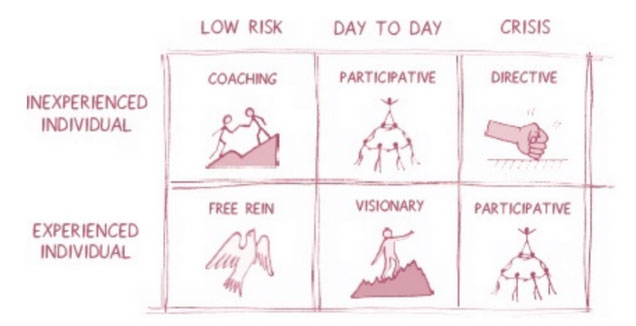HOW TO CHOOSE THE RIGHT MANAEGRIAL APPROACH FOR YOU AND YOUR TEAM

There is no specific personality type or approach that makes someone a good manager. Effective management depends on being clear about what you need from your employees and doing your best to get the most from each of them. Listening to your team, treating everyone with respect and having a genuine desire to help them develop their knowledge and skills will go a long way towards achieving this. Great managers nurture the abilities of their employees and inspire them to pursue a career path they’ll find rewarding.
The right approach to take when managing someone depends on:
- The team’s overall objectives or immediate priorities
- The experience and capabilities of the individual
- The personalities, potential, motivations, and ambitions of other team members
Accounting for these varied considerations makes management a major challenge. The framework below helps managers identify the approach best suited to their current circumstances. It shows that when the stakes are high and time is short, managers should be more prescriptive. This is particularly important with an employee lacking experience. You can give greater freedom and more opportunities for learning when the risks are low, and time allows.
Inexperienced individuals tend to learn quickly if they’re given responsibilities for low-risk projects and only provided with guidance when it’s asked for or essential.
COACHING
When an inexperienced employee is working in a low-risk scenario, you can give them something to own and just enough advice to ensure that they learn from the experience. This builds their confidence, gives them a sense of achievement, and helps them become more resourceful, decisive and independent. As manager, your role is to then keep a close eye on progress and only provide guidance if you see things going awry.
PARTICIPATE
This approach is a great default for day-to-day management. You define the objectives but ask for employees’ input to co-create the plan. You only use your first-among-equals status when needed to resolve a conflict or finalize a decision. A participative approach involves actively checking, on a daily basis, what team members are doing and providing your input if and when it is helpful.
DIRECTIVE
When you need employees to act without debate or delay, you will need to tell them exactly what to do. In a well-run business, this style of management is rarely required. However, in the event of a crisis, the business’s reputation — and survival — is more important than the individual’s development. So, inexperienced team members may need to be given explicit instructions and firm managerial oversight. Experienced teams, on the other hand, should be given more freedom.
FREE REIN
When business is running smoothly, an experienced team member can be given licence to do whatever they think is best for the business, especially if the financial or reputational risk of failure is low. They can be given the freedom and resources to stretch out and experiment as they see fit. This can lead to breakthrough thinking and create new opportunities for the business.
VISIONARY
In day-to-day business matters, an experienced individual can be given authority to make their own decisions, based on the company’s culture and vision. As manager, your job is to continually remind your people of the end goal and motivate them to figure out the best way of getting there.
PARTICIPATE
In a crisis scenario, managers with experienced team members should adopt a consultative approach, drawing on their collective experience and intelligence to identify the best route forward.
Written by Dan White.
Add CEOWORLD magazine to your Google News feed.
Follow CEOWORLD magazine headlines on: Google News, LinkedIn, Twitter, and Facebook.
This report/news/ranking/statistics has been prepared only for general guidance on matters of interest and does not constitute professional advice. You should not act upon the information contained in this publication without obtaining specific professional advice. No representation or warranty (express or implied) is given as to the accuracy or completeness of the information contained in this publication, and, to the extent permitted by law, CEOWORLD magazine does not accept or assume any liability, responsibility or duty of care for any consequences of you or anyone else acting, or refraining to act, in reliance on the information contained in this publication or for any decision based on it.
Copyright 2024 The CEOWORLD magazine. All rights reserved. This material (and any extract from it) must not be copied, redistributed or placed on any website, without CEOWORLD magazine' prior written consent. For media queries, please contact: info@ceoworld.biz
SUBSCRIBE NEWSLETTER












